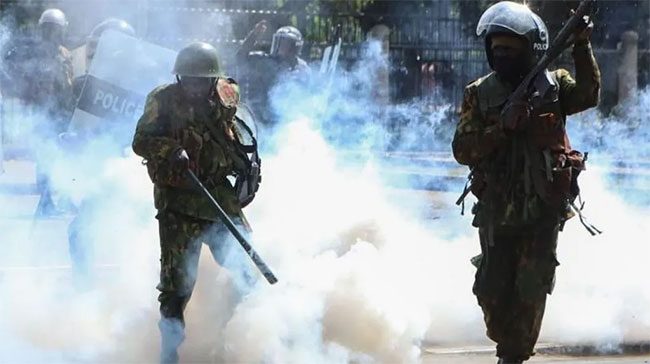Kenya’s president withdraws tax plan after deadly protest
June 27, 2024 01:07 pm
Kenya’s President William Ruto says he will withdraw a finance bill containing controversial tax hikes after deadly protests which saw parliament set ablaze on Tuesday.
In an address to the nation, he said it was clear that Kenyans “want nothing” to do with the bill.
“I concede,” he said, adding that he would not sign the bill into law.
At least 22 people were killed in Tuesday’s protests, according to the state-funded Kenya National Commission on Human Rights (KNHRC).
Mr Ruto said he would now enter into dialogue with the young people, who were at the forefront of the biggest protests to hit the country since he was elected in 2022.
The bill was passed by parliament on Tuesday, despite nationwide demonstrations against it.
Protesters broke into parliament, vandalising the interior and setting parts of the complex on fire. The ceremonial mace, symbolising the authority of the legislature, was stolen.
Mr Ruto initially responded with defiance.
He ordered the military to be deployed, saying “violence and anarchy” would not be tolerated.
But he climbed down on Wednesday, following an extraordinary demonstration of people power.
“Ruto bows to Gen Z pressure, withdraws Finance Bill,” read the headline on Kenya’s Citizen TV.
In his second address to the nation in less than 24 hours, Mr Ruto laid out a very clear rationale for why he thought the tax increases were necessary.
The proposed legislation was part of efforts to cut the country’s massive debt burden of more than $80bn (£63bn), which costs the country more than half of its annual tax revenues to service.
Mr Ruto added that his government had made progress and was on course to “assert sovereignty” by repaying its debts.
He said the provisions would have benefitted farmers, students and teachers, but he admitted the people were not behind him.
“I also lead people,” he said, “and the people have spoken.”
It is unclear clear how his climbdown will affect plans to resume the protests, which have largely been organised via social media, on Thursday.
Chatter on social media suggested that it would still go ahead.
The stated purpose of the demonstrations was to force the president not to sign the bill.
But the protesters have begun demanding that he step down, with the slogan “Ruto must go.”
Mr Ruto rose to the presidency after defeating his main rival Raila Odinga by a narrow margin in the 2022 election.
He got 50.5% of the vote, to Mr Odinga’s 48.8%.
Mr Ruto won after portraying himself as a “hustler” who was challenging an attempt by two dynasties - the Odingas and Kenyattas - to hang on to power.
He promised a “bottom-up” approach to the economy to tackle the high unemployment rate among young people, and to improve the lives of those less well off.
Source: BBC
--Agencies












